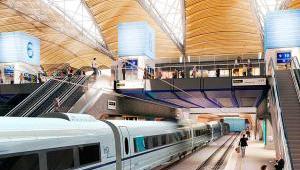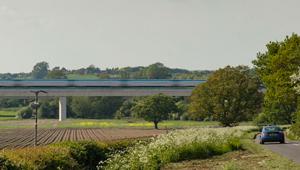In a review of the work undertaken for the project to date, auditors said that options for extending the timetable for building the first stage of the line, from London to Birmingham, were currently being considered.
This first phase is expected to be open by 2026, with an extension onto both Leeds and Manchester to be completed by 2033. The official project cost is £55.7bn, for both infrastructure and new trains.
However, the NAO said that despite good progress with some major procurements, the 2026 target opening date for phase one was at risk.
Auditor general Amyas Morse said this was due to an “unrealistic timetable” set by the government.
“HS2 is a large, complex and ambitious programme which is facing cost and time pressures,” he stated. “The unrealistic timetable set for HS2 Ltd [the government company delivering the line] by the department means they are not as ready to deliver as they hoped to be at this point. The department now needs to get the project working to a timescale that is achievable.”
The progress report stated that the DfT had asked HS2 Ltd to revisit the programme schedule in order to increase confidence for delivery from 60% to 80%, without increasing costs. It has also asked HS2 Ltd to assess the impact of extending the timetable for finishing phase one by up to 12 months.
This was because the programme has faced cost pressures, with construction of phase one forecast to exceed available funding by £204m, according to the report, while planned efficiencies of £1.47bn must also be realised.
There is therefore a risk that the combined impact of cost and schedule pressures could lower HS2’s benefit cost ratio, which has been calculated on the basis of completion well within the available funding. If the total cost exceeds the current budget, then the benefit cost ratio, including wider economic benefits, could fall from 1.7 to around 1.5.
Auditors also highlighted that the formal reviews of the project in Whitehall had been delayed because HS2 Ltd would not reach the required level of capability in time. By May 2016, HS2 Ltd had the capability it had planned to reach in July 2015, but did not pass review point one owing to concerns about cost and schedule.
Responding to the review, HS2 Ltd said it welcomed confirmation that, while many challenges remain, the project is on track both to deliver its strategic scope and to do so on budget.
Chief executive Simon Kirby said the NAO recognised the real progress that had been made in taking the concept of HS2 and moving it closer to reality.
“As the report says, HS2 remains a highly ambitious project, but as it also demonstrates there are real and substantial grounds why the public, government and parliament should have increased confidence in our ability to deliver the project. Our job is to keep earning that confidence going forward,” he said.





















